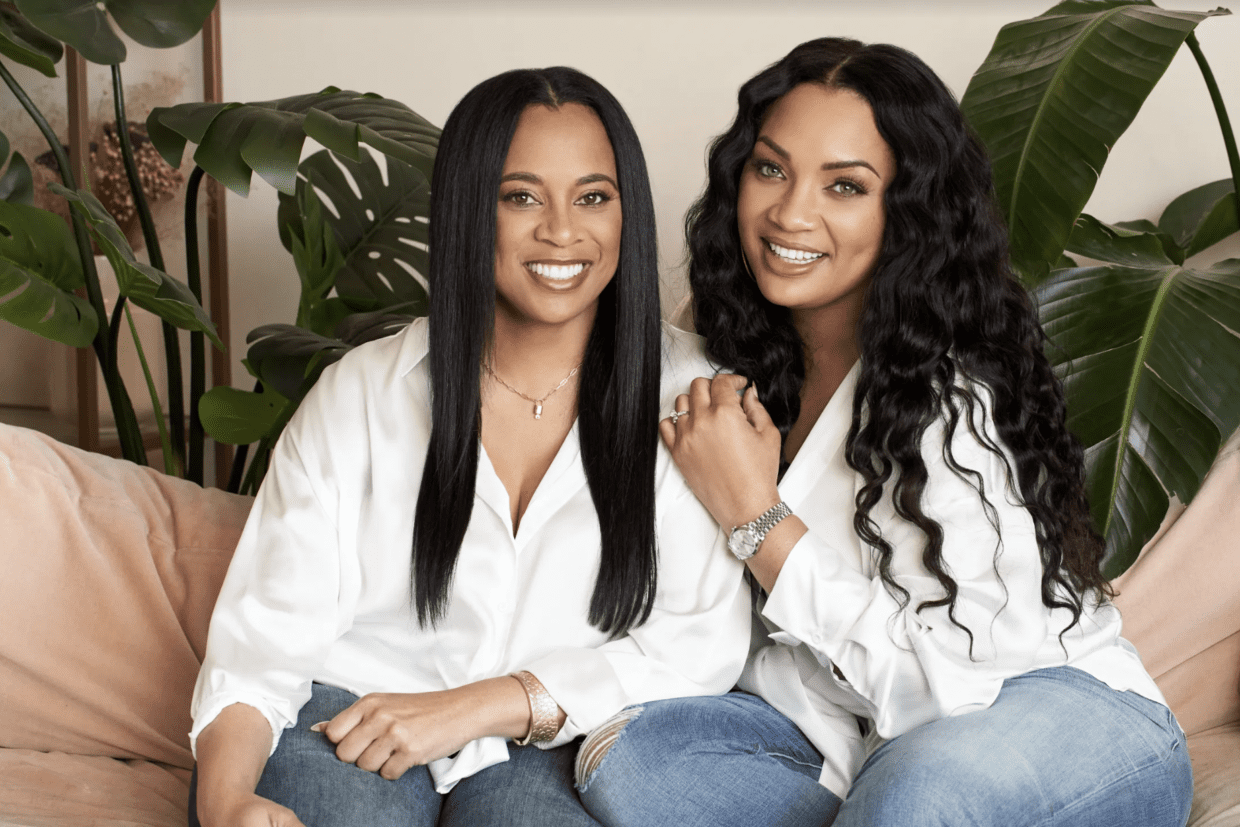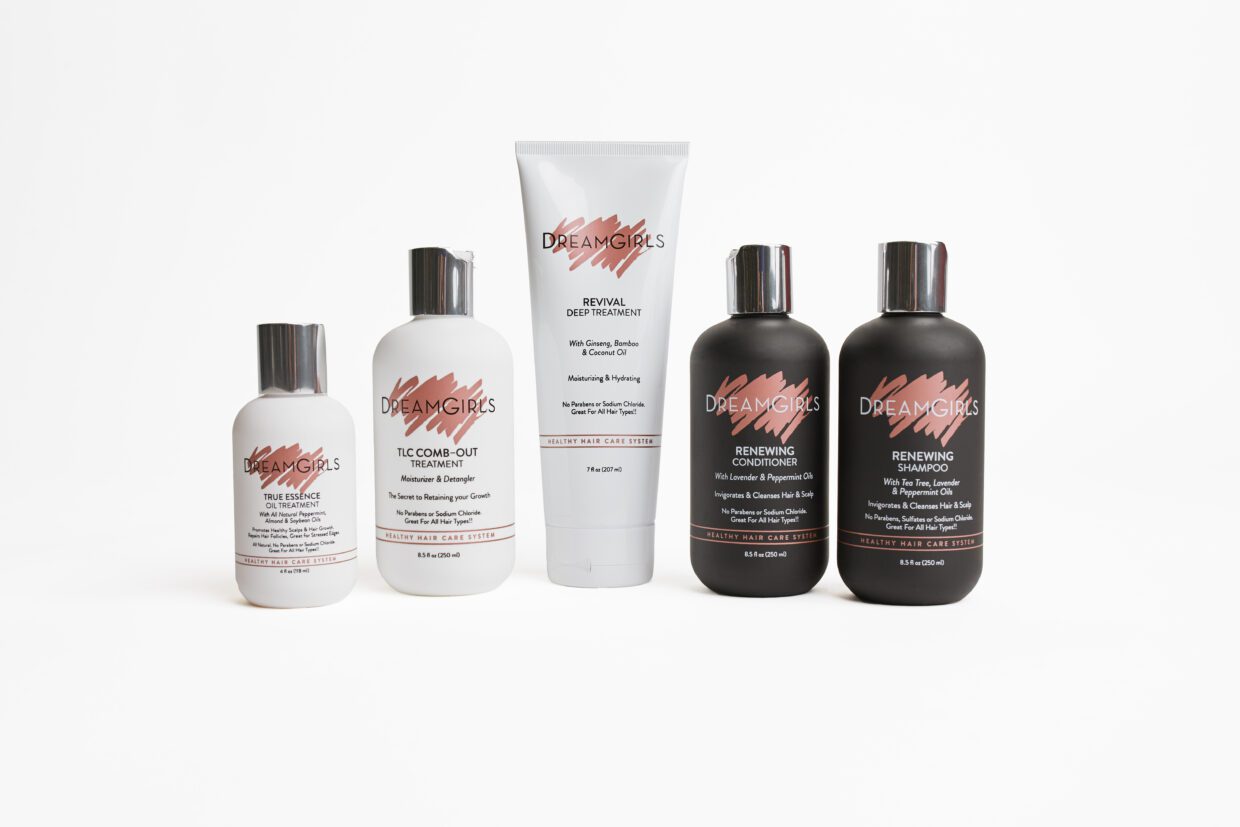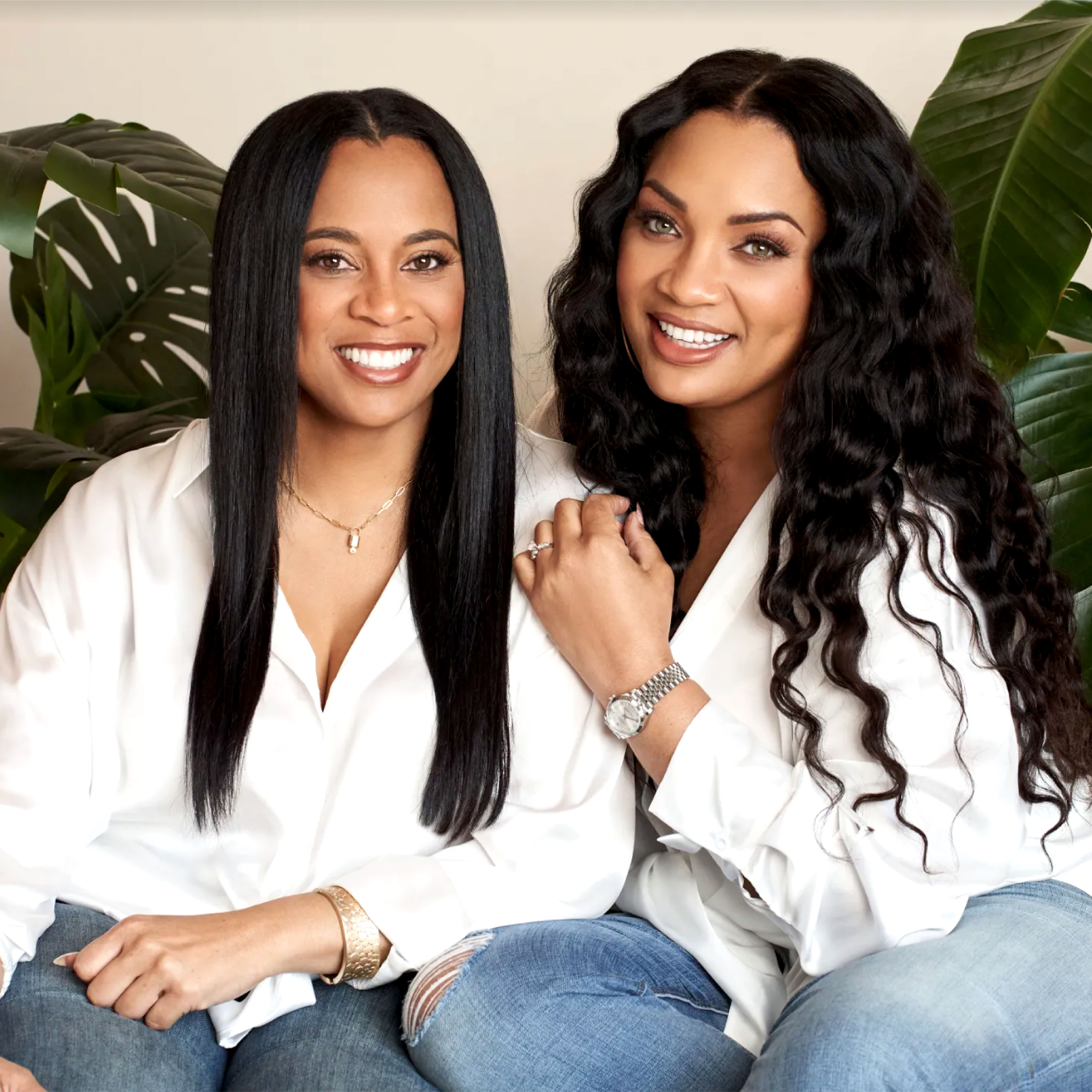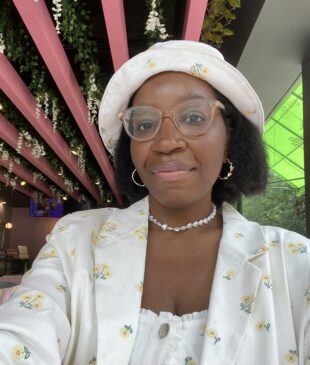While natural haircare lines may be a dime a dozen these days, sisters and professional hairstylists Tonya Thompson and Sharie Wilson have the real hair experience to back theirs up. The duo, who have been recognized for their reputation of having “magic hair-growing hands,” co-founded DreamGirls, a salon and haircare brand that’s helping to break the myth that Black women can’t grow long, healthy natural hair.

“We’re not just a haircare company, but we’re actually two hairstylists that are deeply involved with the products and also want to see our customers—our Black women—achieve the results,” Wilson tells The Tease. “Whatever we have to do to help you achieve your results, we’re going to do that.”
Having only launched in March of 2020, their brand is still very much a newcomer in the haircare space. And yet, they are already making waves in the industry thanks to their signature five-step Healthy Hair Care System ($125), a key component to achieving the brand’s wow-factor results.
The Tease recently caught up with Thompson and Wilson to learn more about what inspired their product line, how they achieved over $2.5 million in sales during their first year, and what’s next for the DreamGirls brand.
The Tease: What inspired you to launch your now signature Healthy Hair Care system and how did it all start?
Tonya Thompson: “When we were growing out here [in California], we didn’t realize we were doing something that was so different from everyone else, until we started posting about it. I think I did this one post because I was kind of sick of the stereotypes of people saying that if you wore braids or weaves and things like that, you were what they considered a chicken head or bald headed or that you didn’t have any hair. So, I remember just posting, saying, “Look, my client has been in this weave, and she’s been wearing it off and on for 18 months, and look at how long her hair is.” And, the natural hair community tore the post up—like literally tore it up. They were saying things like, “That’s not her hair!” And, it was a big thing. But, the people who did like the post started saying, “Can I do that? I want to do the 18 month program.” I was like, “18 month program?” So, they literally named the Healthy Hair program. And, then we just kind of went on doing everything that we normally do in the salon and put together a whole little package and we started the Healthy Hair Care System.
We started traveling with it and growing out everyone’s hair. I would say our success rate is like 95 percent. We started putting everything together and figuring out what we need and we use, on a regular basis to make this happen. And, we started looking into products—trying to formulate products and put products together. We worked on it and we were traveling that whole time as well. We went to New York every three months for two years straight. So, we committed to two years and we were ending that two years when the pandemic started. At the same time, we were starting to come out with our product line. We did a three-day sale prior to the pandemic just to get seed money to purchase our products and we did $30,000 that weekend. And, they knew that they weren’t going to get their products right away and that it was going to be about a month or so. So, we purchased the products and they had a date to receive their products.
Well, during that time, we were going to do a launch party when we fully received our products and the pandemic hit that weekend actually. We were like, “Oh my God! What’s going to happen?” at that point in time when the pandemic hit. Everyone was kind of like, “Is this going to be over next week or is it going to be two weeks? What’s going on?” Then, we saw that it was not changing and they started talking about lockdowns. So, I was like, “Look, we just need to move forward. Let’s do a soft opening, open up the website, and keep it moving.” I kid you not, that first six months, we made a million dollars—from opening up the website and just going without a launch party or anything. So, we just continued our journey from then on out. The first year we ended with $2.5 million in sales and we’ve just been moving more and more and more every year. Thus far, we’ve made probably almost about $6 million.”

Your brand surpassed $2.5 million sales in its first year, which is incredible. What factors do you feel contributed to the brand’s rapid growth in such a saturated space like haircare?
Thompson: “Well, I think there’s a couple of factors. One is the pandemic because people weren’t able to go to the salon. And, I think that people were really waiting for something like this—there’s so many people in our community that were waiting. This was just something they hadn’t seen. You know, people come out with products and say it will grow your hair. But, to come out with products and say it will grow your hair and they’ve been able to see all of our results—we don’t just talk it, we show it. And, we show it everyday—not just with the same people or certain types of people, but with all types of people. People are able to see themselves in the results that we show, because we’re showing a little bit of everyone. So, I think this was just something that people were waiting for— for somebody to take them under their wing and show them how to grow their hair.”
What would you like people to know about your products, particularly your Healthy Hair Care System?
Sharie Wilson: “When we decided to name our products, we wanted to be very intentional about that. Why? The reason why is because when you go to different stores and you pick up products for African-American people, what you typically see is words like, unruly, uncontrolled, and rough. Just the names alone don’t give you hope. It just makes you feel like, I’m dealing with something that’s like a disease, you know? Also, we wanted to make sure when we named our products that not only do we speak life into the products, but we speak life into the people who use the products, too. Our people are always faced with negative images when it comes to our hair. We wanted to make sure that we name things that speak life into our hair. And, so we have our TLC (Tender Loving Care) Comb-Out Treatment and you’ve gotta do TLC when you comb out your hair. And, then our shampoo is called Renewing. You know, let’s renew that scalp. Let’s get that scalp clean. And, then we also have the Renewing Conditioner. We also have the Revival Deep Treatment.
And, everything we do is about educating our consumers and our clients. I want to say 80 percent of our customers that use our products have never sat in our chairs. They just heard about us on either social media or through their friends and family. They get the kit and we send instructions, giving them step by step on how to use our products. One of the things that me and my sister pride ourselves on is not just creating a product, but creating a product and helping our clients and our customers use the products. We also offer our customers across the U.S. and abroad consultations all the time, where our clients are on a Zoom call and they’re showing us what’s going on with their hair. If something’s not working, we’re helping them tweak it. We’re giving them suggestions.”

Tell me about the inspiration behind naming the brand, DreamGirls. Does it hold a special meaning?
Wilson: “When we came up with the name, we were actually watching the movie [Dreamgirls], too. I think the movie just came out. With the movie, Dreamgirls, it really showed Black women dreaming higher than themselves. Black women believing that they can reach the stars. And, that’s what we want for African-American women.
You know, one thing about us—well, women, period—is sometimes when you look in the mirror, it’s self-esteem issues, right? If your hair is not right, you don’t feel good. You don’t feel love. So, just imagine all of the things that have been said to us about our hair—like, “You need to get it straightened”. Now, it’s kind of like the vision within our culture, right? You got the 4C hair and you got the people who have not so kinky hair, and then you got the mixed hair, and then it’s like all of us fighting within. So, something is always showing us that we’re not good enough. And, so we want to let all women of color know that you’re good enough.
One of the ways that me and my sister can do that is by showing them something that they look in the mirror every single day and get depressed about, like their hair, can be beautiful. And, with that, we’ve been seeing so much confidence with the women. When the women start seeing their hair down their back, they literally start crying in the salon. You know, we have people flying in from all over. And, it’s amazing seeing the boost they have to go out there and take over the corporate world or go out there and become that entrepreneur and be able to go into those meetings and stand tall with confidence. I say all the time that our chairs—me and my sister’s chairs—are actually our pulpits. This is where not only do we do hair, but this is where we minister too. This is where we speak life into people and just show them that there’s more in them.”
What differentiates Dream Girls from a lot of the other haircare brands in the industry?
Wilson: “We’re two African-American women that made a product for African-American women that have actually had our hands in African-American hair of all textures. It doesn’t matter if you’re mixed or whatever, our hands have touched somebody’s hair like yours. So, I think that’s the difference. We’re not just a celebrity that’s putting our name on a bottle. We’re not just somebody who’s saying, “Oh, you know what, I’m about to make a product for curly hair because there’s no products out there.” We’re two sisters that made a product for every woman with textured hair because our hands have been in all textures and continue to be in all textures. This is what we do and that’s the difference.”
Much has been said about the lack of education in the salon industry when it comes to working with textured hair. Many stylists do not know how to work on curly, natural, or textured hair types. With DreamGirls, education seems to be a huge focus for the brand, particularly when it comes to educating other hairstylists on how to use your haircare systems. Could you speak on what role, if any, the brand is playing with regards to texture education?
Wilson: “So, one of the things we said the other day was that we felt like there wasn’t really a table prepared for us. You know, they say that if they don’t let you have a seat at the table, you go out there and build your own. Well, I felt like me and my sister built our own table so we can empower them—show them something and then they can go out and help other people because we can’t touch everybody yet. If we help other hairstylists, then we can touch more people without actually touching them physically. We can touch them by educating other hairstylists on how to care for texture hair and so forth.
We own a cosmetology school, too. And, that was one of the reasons why we opened up the school. It’s called the Mixed Institute of Cosmetology and Barber, and we just opened up a nail tech program and are about to do an esthetician program. But, what we found was stylists were coming to our salon not knowing how to do textured hair because in the schools, they teach you only on straight hair. So, African-Americans, or anybody who really wants to work on textured hair, they really have to go out and pay for other classes to get that information, because it wasn’t taught in the schools. Our school teaches textured hair. It teaches all hair, but we teach actual textured hair. So, when our students graduate, they know how to deal with their hair and they also know how to slay some African-American hair as well.”
What is on the horizon for DreamGirls?
Thompson: “Well, one of the things we want to do is hopefully be able to move our products into the retail space, only because we want it to be noticed more. We’ve been hit up from all over, especially like Africa. I have a client who flew here from Kenya to get her hair done and she’ll be coming every three months. So, I have clients like that. We need to get over into these spaces so that we can help everyone and not just our local community and not just people who can afford to get a ticket and fly to us.”
Wilson: “There’s a lot of women who can’t afford doing that. So, we need to be able to touch them. We need to be able to get to them.”
To learn more about the DreamGirls brand, be sure to visit www.dghair.com and follow @dreamgirlshair on Instagram.


